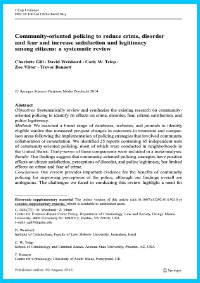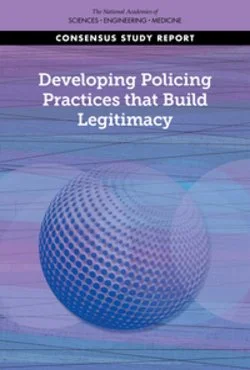By Roberto Santos and Rachel Santos
The three elements of community policing are (1) partnerships, (2) problem-solving, and (3) organizational transformation. These elements depend on one another: To develop meaningful partnerships with the community and conduct collaborative problem-solving, the community must trust the police and see them as legitimate in their authority. Research has established that an effective way of increasing legitimacy and trust is consistent, positive engagement between police and community members. Police departments have developed many community policing programs and events that bring police and community members together to interact in positive ways; some of the longest-established include Police Athletic Leagues (PAL), National Night Out, and Coffee with a Cop. Generally, such programs are carried out by designated community policing units or a small number of specific personnel, or through a publicity campaign or social media. There are fewer established models for implementing community engagement departmentwide. This guide focuses on promoting positive interpersonal interactions between community members and officers at any rank outside of normal law enforcement, management, or administrative duties. These proactive community contacts could be one-time or regular interactions, but they are personalized, often brief, direct, and positive. The significance of a simple type of interpersonal connection cannot be stressed enough: Research shows that community members’ opinions of police are greatly affected by positive contacts.3 The challenge is setting up a framework to make officers—not only patrol officers, but detectives, sergeants, managers, and commanders—more willing to proactively and consistently engage with the community in a way that makes sense for their positions and can easily become part of their normal duties. Such a framework can help an agency more easily systematize department-wide community engagement to build legitimacy and trust, which improves community acceptance of police efforts to partner, problem-solve, and prevent crime. Hearing from the police is important to translating concepts supported by research into realistic ways to operationalize best practices. The discussion in this guide is the outcome of focus groups conducted with officers at every rank from a wide range of departments across the United States. Ninety-seven people participated in 12 focus groups conducted via video conferencing—two each of officers or detectives, sergeants, lieutenants, captains or commanders, executive-level staff, and agency heads. The objective of the focus groups was to understand what would make law enforcement—both individuals and the broader police culture—more amenable to community engagement in daily activities and to identify challenges to community engagement implementation. Analysis of the conversations focused on finding out which activities are easy and realistic for law enforcement officers to implement individually and what organizational support they need to do so. The results, presented here, offer considerations about how to operationalize proactive community engagement with clear expectations, mechanisms for accountability, and alignment with proactive crime reduction and crime prevention. The discussion covers why community engagement is important; a framework, outlined by the major themes from the focus groups, for operationalizing community engagement; and, as an example, an application of the framework to one specific community engagement strategy—community walks. Our hope is that agencies will use this framework to implement any type of engagement strategy that can work for their communities.
Washington, DC: Office of Community Oriented Policing Services., 2024. 26p.





